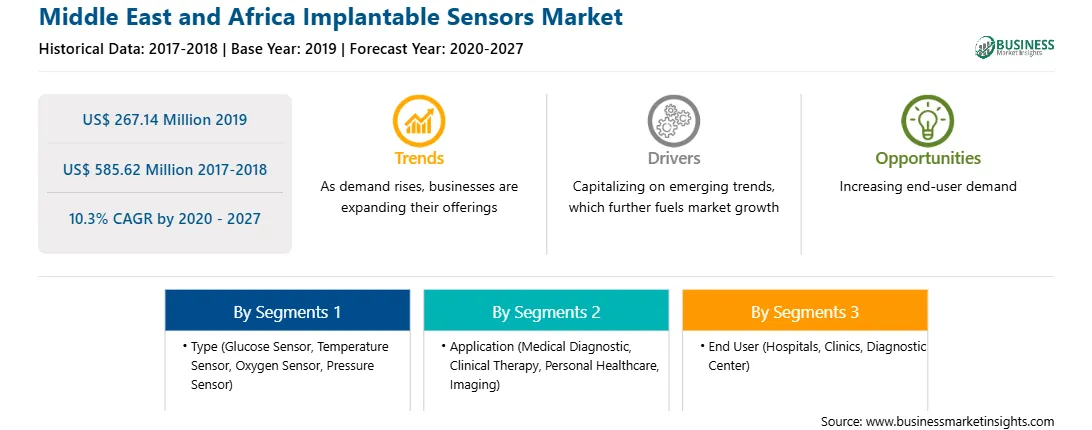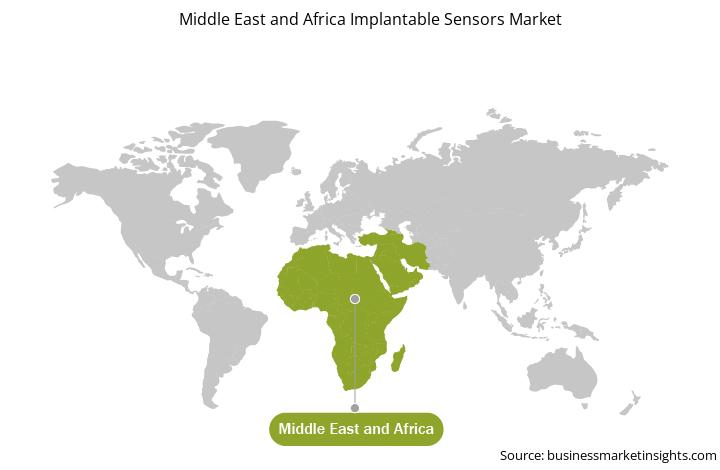中东和非洲植入式传感器市场预测至 2027 年 - COVID-19 影响和区域分析(按类型(血糖传感器、温度传感器、氧气传感器、压力传感器等)、应用(医疗诊断、临床治疗、个人保健和成像) )、最终用户(医院、诊所和诊断中心)和国家/地区
No. of Pages: 119 | Report Code: TIPRE00019848 | Category: Life Sciences
No. of Pages: 119 | Report Code: TIPRE00019848 | Category: Life Sciences
植入式传感器可实现自我监测系统,其中患者充当传感系统的一部分来检测有意识或无意识地改变健康状况。植入式传感器已在医学研究中用于测量人体内的力、扭矩、压力和温度等参数。这些先进的传感器系统必须体积小、与人体组织兼容,并且足够坚固以承受人体的物理力。它们还必须是自供电的并且能够无线传输数据。理想的传感器系统坚固且简单,可以最大限度地减少故障或失效的可能性。
中东和非洲植入式传感器市场预计将从2019年的2.6714亿美元增至2027年的5.8562亿美元。预计该市场将以10.3%的复合年增长率增长从 2020 年到 2027 年。该市场的增长预计将由于关键驱动因素而增长,例如医疗保健行业的日益私有化、医疗保险政策的日益普及以及中东和非洲慢性病患病率的激增。然而,由于植入式传感器存在多种问题,市场增长可能会受到阻碍。
< strong>主要细分市场
根据类型,植入式传感器市场分为葡萄糖传感器、温度传感器、氧气传感器、压力传感器等。根据应用,植入式传感器市场分为医疗诊断、临床治疗、个人保健和成像。根据最终用户,植入式传感器市场分为医院、诊所和诊断中心。
报告中包含的植入式传感器市场的一些主要一手和二手来源是迪拜卫生局 (DHA)、健康保险合作委员会 (CCHI)、 等。
按类型
按应用划分
最终用户
按国家/地区
Strategic insights for Middle East and Africa Implantable Sensors involve closely monitoring industry trends, consumer behaviours, and competitor actions to identify opportunities for growth. By leveraging data analytics, businesses can anticipate market shifts and make informed decisions that align with evolving customer needs. Understanding these dynamics helps companies adjust their strategies proactively, enhance customer engagement, and strengthen their competitive edge. Building strong relationships with stakeholders and staying agile in response to changes ensures long-term success in any market.

| Report Attribute | Details |
|---|---|
| Market size in 2019 | US$ 267.14 Million |
| Market Size by 2027 | US$ 585.62 Million |
| Global CAGR (2020 - 2027) | 10.3% |
| Historical Data | 2017-2018 |
| Forecast period | 2020-2027 |
| Segments Covered |
By 类型
|
| Regions and Countries Covered | 中东和非洲
|
| Market leaders and key company profiles |
The regional scope of Middle East and Africa Implantable Sensors refers to the geographical area in which a business operates and competes. Understanding regional nuances, such as local consumer preferences, economic conditions, and regulatory environments, is crucial for tailoring strategies to specific markets. Businesses can expand their reach by identifying underserved regions or adapting their offerings to meet regional demands. A clear regional focus allows for more effective resource allocation, targeted marketing, and better positioning against local competitors, ultimately driving growth in those specific areas.

The Middle East and Africa Implantable Sensors Market is valued at US$ 267.14 Million in 2019, it is projected to reach US$ 585.62 Million by 2027.
As per our report Middle East and Africa Implantable Sensors Market, the market size is valued at US$ 267.14 Million in 2019, projecting it to reach US$ 585.62 Million by 2027. This translates to a CAGR of approximately 10.3% during the forecast period.
The Middle East and Africa Implantable Sensors Market report typically cover these key segments-
The historic period, base year, and forecast period can vary slightly depending on the specific market research report. However, for the Middle East and Africa Implantable Sensors Market report:
The Middle East and Africa Implantable Sensors Market is populated by several key players, each contributing to its growth and innovation. Some of the major players include:
The Middle East and Africa Implantable Sensors Market report is valuable for diverse stakeholders, including:
Essentially, anyone involved in or considering involvement in the Middle East and Africa Implantable Sensors Market value chain can benefit from the information contained in a comprehensive market report.